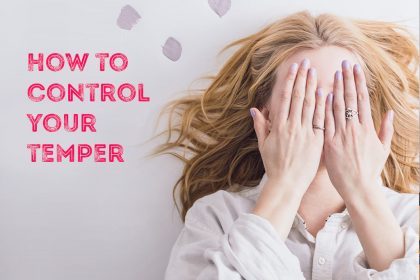How to avoid (and beat) anxiety and depression
Are you suffering from anxiety or depression? Learn simple lifestyle changes to help you avoid and beat anxiety and depression.
According to the Mental Health Foundation, in 2013 there were 8.2 million cases of anxiety in the UK, women are almost twice as likely to be diagnosed with anxiety disorders as men, and 10% of mothers and 6% of fathers in the UK have mental health problems at any given time.
In 2009, the mental health charity Mind also discovered that in England:
- 2.6 in 100 people have depression.
- 4.7 in 100 people have anxiety.
- 9.7 in 100 people have mixed anxiety and depression.
How to avoid (and beat) anxiety and depression
If you’re suffering from anxiety or depression, or living with someone who may be, what can you do to help? And even better, what positive life habits can you adopt to avoid depression and anxiety in the first place?
The good news is that there is a great deal that you can do to increase your chances of avoiding anxiety and depression, and beating it if you are suffering right now. Many of them are simple lifestyle changes and new mentally healthy habits to adopt.
To help you, here are some anxiety and depression-busting strategies that people who have fought depression have used and found helpful.
Get outside
Numerous studies show that exercise is vital for good mental health, and in avoiding and helping with anxiety and depression in particular. And the great news is that you don’t need to launch into Olympian-like training, or even to join a gym if you don’t want to – a simple 10-minute walk can be just as beneficial as a 45-minute workout.
Even better if you can get out into nature for a walk; a recent study discovered that walking in nature could lead to a lower risk of depression. The study looked at the impact on a region of the brain associated with a key factor of depression and found that people who walked for 90 minutes in a natural area, as opposed to those who walked in a high-traffic urban setting, showed decreased brain activity in that area.
So if you live near a park, woods or a beach, make a point of talking a walk there as often as you can. Or even just sit out in your garden, or work with a view of greenery if you can.
Change your focus
It’s all too easy to focus on what we don’t have, and the things and people in our life we wished we could change. But when we focus on everything that is wrong with our life, those things can become our life. As Buddha said: “We are what we think. All that we are arises with our thoughts. With our thoughts, we make the world.”
With your thoughts you make the world. Or, more importantly, you make your world. If you focus on everything that is wrong with your life, that is where your attention goes. You notice more any more of the things that annoy, frustrate and upset you. They fill your mind and prevent you from seeing anything else – contributing to increased anxiety and depression.
Imagine if, instead, you focused on everything that was right in your world? The beauty of nature? The kindness of the people you know? The simplicity and stillness of a cup of tea first thing in the morning?
Yes, the people in your life may be flawed. You may have financial or other problems. But people are rarely all bad (and if they are truly toxic then you need to get them out of your life!) and problems can be tackled and put into perspective. (Read a simple, 4-step technique to coping better with worries.)
True, the world isn’t a perfect place. But rather than noticing everything that is wrong, choose instead to focus on everything that is right. if you do, that will become your world. And isn’t that a much nicer place to live?
Be thankful
Taking this concept one step further, we actually want you to be thankful for the many wonderful things that fill your world.
At first consideration this may seem a strange request – if you’re anxious or depressed, what have you got to be thankful for? But that’s exactly why gratitude is so powerful; it forces you to consciously change the way you look at your world. And conscious choices eventually lead to healthier unconscious habits, which lead to a happier, more contented life.
Indeed, research shows that gratitude can combat depression and anxiety. Here are some techniques to help you use it and start noticing the benefits:
- Find one thing a day to be grateful for – it can be as simple as your partner making you a cup of tea, to as welcome as your baby sleeping through the night.
- Say thank you – start practising gratitude by thanking people for the little things they do (and notice the positive changes that brings as a result).
- Notice beauty – make a point every day of looking for three beautiful things. From the sky, a flower or a tiny bird in the garden, to a book cover or piece of fabric you love. The more you notice beauty, the more you’ll see.
- Call someone – at least once a week, call someone and let them know how much you appreciate something they have done or a quality they have, or just the fact they’re in your life.
- Make a gratitude list – start a gratitude list and add to it every time you think of something you are thankful for. Once a week, read your list.
Volunteer
Nothing helps put your own problems into better perspective quicker than looking for ways to help solve other people’s – and that’s one of the reasons why volunteering is so powerful in helping with anxiety and depression.
There are a number of reasons why volunteering is so good for your mental health:
- It connects you with others – volunteering is a great way to meet new people and introduce you to a new community (or get you more involved in your own).
- It gives you a sense of purpose – volunteering gives you a reason to get up in the morning or go out beyond your own needs. It also helps with mental stimulation and goal-setting/achieving.
- It stops you thinking too much – the worst thing you can do if you are anxious or depressed is to spend too much time thinking. Volunteering gets you out, doing and taking your mind off YOU.
- It can help you stay physically fit – depending on what activities you choose to help with, volunteering can help you stay physically fit and active. it also tires you out so you find it easier to sleep.
- It can help your career – if you’re struggling to get back into your career, volunteering gives you valuable experience. It can even introduce you to new skills and career directions.
So how can you volunteer? You can find local and national opportunities on websites like Timebank and NCVO. You can also get involved in local groups like your school PTA or wildlife organisations – find something that matches the time you have available and your interests.
Breathe
Learning to breathe properly is a powerful way to combat anxiety and even stop hyperventilating and panic attacks. And the brilliant thing is that it’s easy to master, and requires no special tools!
During our psychotherapist and hypnotherapist training we were taught the 7-11 breathing technique, and have used it ever since to eliminate anxiety and panic attacks. This is how to do it:
- Breathe in slowly for the count of 7.
- Exhale slowly for the count of 11.
This works so well for two important reasons:
- When you hyperventilate you don’t give your body the chance to retain carbon dioxide, so it cannot use the oxygen it has. (This is why you can feel like you are unable to breathe in a panic attack – panicking you more!) The 7-11 breathing technique gives your body chance to get more carbon dioxide.
- It also switches your focus from whatever is causing the anxiety to your breathing, helping to calm you down.
But it’s not just when you’re panicking that good breathing habits can help. If you are often anxious you can feel yourself breathing shallowly, and your heart pounding – even if you are not actively panicking in that moment.
In fact, you can feel all the symptoms of panic on a low level as an everyday state as your body produces more and more stress hormones – making you feel even more anxious (and exhausted).
If you live with ‘low level’ anxiety like this much of the time, practising better breathing habits can help. You don’t need to use the full 7-11 breathing technique, but simply consciously slow down your breathing. Breathe in, hold your breath for a moment and breathe out slowly.
If you start practicing the guided breathing exercises from breathwrk.com whenever you notice the familiar feelings of low level anxiety or panic, you can start to regulate your hormones and physical response to every day stresses. Over time, better breathing will become a habit, helping to break the damaging cycle of low level anxiety.
Sleep
One of the most common symptoms of depression is trouble sleeping. You may find it hard to fall asleep in the first place, or you could wake in the night and be able to go back to sleep again.
You can also feel exhausted and sleepy in the day time, and feel like you’re unable to get through the day without a nap. Or simply spend hours lying in bed without sleeping but feeling unable to move nonetheless.
Sleep is important for your general good health, and prevention of anxiety too; you feel much better equipped to face whatever the day throws at you after a good night’s sleep.
If you have trouble sleeping, here are some quick tips to help you drop off at night (and stay asleep):
- Spend time outside in the day time.
- Get exercise during the day (but stop at least four hours before you sleep).
- Eat regular meals.
- Avoid daytime naps.
- Cut down on caffeine and chocolate.
- Cut down on smoking and drinking.
- Keep your bedroom cool, dark and quiet.
- Remove any electronic device (including TV from your bedroom).
- Go to bed at the same time every night.
- Start a pre-bed wind down routine an hour before you sleep.
- Keep a ‘worry pad’ beside your bed and write down any worries.
You can also read more advice on getting a good night’s sleep here.
Eat well
When a hypnotherapy client came to us with feelings of anxiety, one of the first things we’d would find out was how much caffeine, sugar or tobacco they consumed. And often we’d discover that they would skip meals and rely on coffee, fizzy drinks, sugary snacks or cigarettes to tide them through.
The simple fact is that if you want to enjoy good mental health, you need to respect your body. And that means eating healthy food at regular intervals. Think of your body as a machine – if you stopped putting in petrol in your car (or filled it with the wrong type of fuel), eventually it would grind to a halt. And your body is no different. It needs to be filled up with quality food and drink regularly.
And it’s not just anxiety that your diet can impact. There are several nutritional imbalances that can make you more prone to depression. To ensure that you are eating mood-boosting foods, ensure your diet has a good balance of:
- Essential fats like Omega 3 – you’ll find these in some fish, nuts and seeds.
- B vitamins – foods high in B vitamins include poultry, fish, eggs, whole cereals, broccoli, spinach, lentils and liver.
- Vitamin D – you’ll find this in fortified breakfast cereals, breads, juices and milk (the best way to get it is doe sunshine though).
- Selenium – cod, Brazil nuts, walnuts and poultry are all good sources of selenium.
- Tryptophan – you’ll find this in protein like turkey, beef and eggs, and in dark, leafy greens.
If you want some depression-busting diet ideas, you’ll find 24 ‘happy meals’ here.
Meet your needs
As we explained in our popular article How working can help mums beat depression, to function properly and healthily we need to meet a number of basic human emotional needs:
- To give and receive attention.
- To care for our body and wellbeing.
- To have purpose and goals.
- To connect to something greater than ourselves.
- To have stimulation and challenge.
- To feel intimacy and connection.
- To have a sense of control.
If a number of these needs aren’t met over a period of time, it can lead to depression. And it’s easy to let them slip with out noticing, for example:
- If you’re absorbed in a big work project you work late, missing sleep, and replace meals with sugary snacks or coffee.
- You have a young baby, don’t see your old work colleagues, your friends are at work and you find it hard to get out of the house.
- You don’t love your career, and get no sense of accomplishment or validation in achieving goals and earning respect.
Many of the tips we’ve already covered off in this article help towards meeting your basic needs – exercise, diet and sleep helps you to care for your body and wellbeing, volunteering can contribute towards purpose and goals, giving and receiving attention and stimulation and challenge, practising gratitude can help with intimacy and connection, and changing your focus gives you a better sense of control over your life.
Beyond these, we recommend considering what needs may be missing in your life, and how you can find ways to fill them that feels authentic to you.
Empower yourself
It’s easy to find outside reasons why we may feel anxious or depressed – our partner has left us, we’ve lost our job, or are struggling financially – but just because life isn’t great right now, it doesn’t mean that you need to succumb to anxiety and depression.
Instead, by empowering yourself you can take control of your life and mood and enjoy good mental health – and be better able to cope with whatever life throws at you.
As well as taking on board the advice in this article, we recommend:
- Reading the excellent Depression Learning Path and understanding how depression works (and how to beat it).
- Taking the Be Mindful Online course offered by the Mental Health Foundation.
- Reading Overcoming Anxiety: Reassuring Ways to Break Free from Stress and Worry and Lead a Calmer Life, a new book by bestselling personal development author Gill Hasson.
- Checking out these exercises for depression from MyMed for an endorphin boosting workout.










